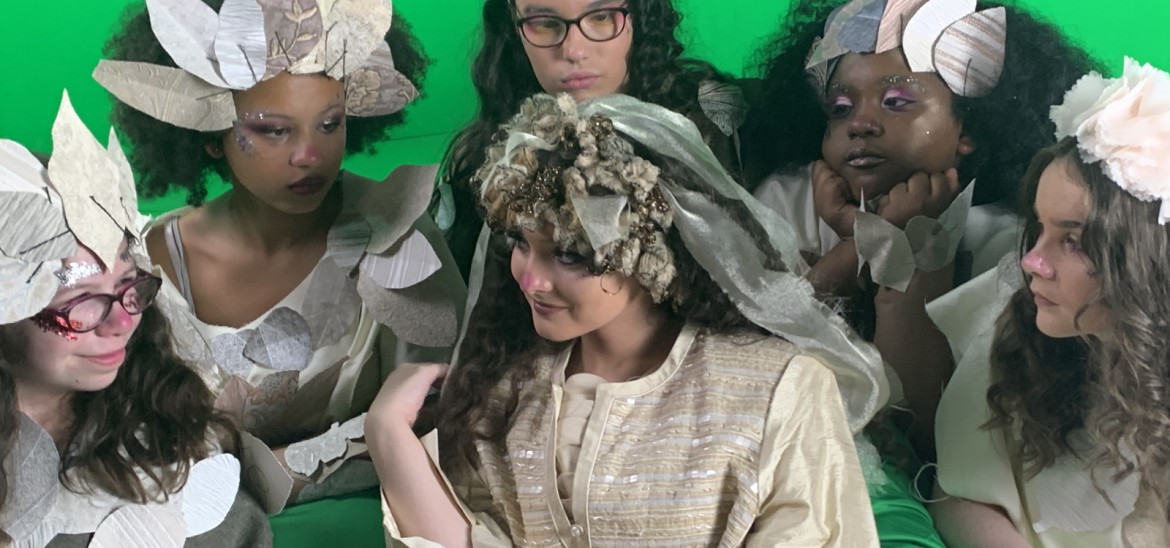Into Film Clubs
Find out everything you need to know about starting an Into Film Club.



Recently, we partnered with Coram Shakespeare Schools Foundation (CSSF) to bring Shakespeare to life through filmmaking as part of their annual Film Festival programme.
Following the culmination of the 2022 Coram Shakespeare Film Festival, we spoke to two schools whose films featured really stood out for their originality and creative expression: Dawn House School for 5-19 year olds in Nottinghamshire, and Beechcliffe School for students aged 11-19 years in Yorkshire. Both schools are special provision, and reported how effective filmmaking was for their learners, in terms of imagination, inclusion, accessing Shakespeare and developing communication skills.
Clare Tiffany, Teacher and Leader of Creative Arts, Beechcliffe School: Our school is a Generic Special School, and the Arts are hugely important to many of our students - we try to give them as many opportunities within these areas as we can. Coram's Film Festival and Theatre Festival offer a really unique chance for students to be involved in a fantastic performance opportunity, bringing to life legendary works that they may not get much exposure to otherwise. I find that after each project, students talk about it for years afterwards and ask when we will be taking part again. So this lasting impact and fostered passion alone are enough to make taking part well worthwhile.
Andy Metcalfe, Teacher of Performing Arts, Music and Media, Dawn House School: Dawn house school is part of Speech and Language UK, the children's communication charity, so inclusion was a major factor. The school has a long filmmaking tradition, and media/performing arts and music is a big part of our curriculum. I feel the students at the school deserve to be given the opportunity to study and tell Shakespearean stories. What is great about film is it includes almost everyone: actors, camera work, sound, music, set design, costume, post-production, editing… the list is endless.
Clare: They loved taking on multiple roles and striving to get into their characters. All the students reported enjoying the experience and being proud of what they had achieved. One student began very unsure and lacked confidence in his ability to say the lines, but grew in confidence and ended up developing their role even further than direction. They enjoyed ad-libbing and creating backstories for the character!
Andy: The approach was to collaborate with other departments (English, art, media, and Forest Schools). The script work was supported by the therapy team who adapted some of the lines for the students. So it had a whole-school feel to it, which I feel encouraged the students to want to get involved and take ownership of the project.
The school has embraced film across the curriculum because of the endless possibilities around access and communication opportunities for students with DLD (Developmental Language Disorder). They have accepted that Shakespeare is not old fashioned and difficult to understand, but exciting and relevant to today's modern world. I think film has played a big part in that shift.
Clare: We run our Coram Shakespeare Schools Foundation projects as an extra-curricular offering, with the opportunity for students across school to be involved. This is great for inclusion, but means all rehearsals etc need to fit within our school timetable for all relevant groups. This was the first year that we didn't have a designated slot, so we had to fit it in 'as-and-when' within the school schedule and everyone's timetables. It was tricky, and we were disrupted by some illness, but we got there in the end and are proud of what we achieved.
Andy: We made the film in the Autumn term and the English department studied Macbeth alongside the movie-making, which meant the whole school was involved in the process. The film gave us the opportunity to include every key stage - something a theatre production could not offer the students. Some of the scenes were whole-school events, such as an afternoon given to filming Macbeth's homecoming.
Clare: This year we had hoped to film many of our forest scenes outside in the school grounds, but the weather did not allow for this when we had scheduled. This meant we didn't have as much variety in shots as we had hoped for, as we had to film the whole story using the green screen. The students handled this change very well; their characters shone through and it allowed us to use a plethora of artwork from students across the school as backgrounds.
Andy: Speech and language. Our DLD learners were given support to understand the main themes of the story through staff summarising it, watching films of other performers, and through careful, differentiated questioning about what was happening in each scene. Some learners were supported to understand the meaning of and practise pronouncing specific words. Others were supported to think about rhythm and use rap to help them overlearn and practise their lines. Explanations were sometimes also given about ambiguous language.
You can watch an extended 'best of the fest' video on the Coram Shakespeare website, featuring films by many other schools made during the 2022 Shakespeare Schools Festival, as well as watch all of the individual films in full. You can also register your interest in taking part in the 2023 programme, and bring the magic of Shakespeare into your school or education setting.
Viewing 4 of 4 related items.

Find out more about our streaming service, designed specifically for UK schools.